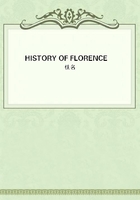
第153章
You may remember that during your father's exile, regarding more the injury done to him than my own misfortunes, I was banished, and in danger of death, and never during Cosmo's life failed to honor and support your family; neither have I since his death ever entertained a wish to injure you. True, it is, that your own sickness, and the tender years of your sons, so alarmed me, that I judged it desirable to give such a form to the government, that after your death our country might not be ruined; and hence, the proceedings, which not against you, but for the safety of the state, have been adopted, which, if mistaken, will surely obtain forgiveness, both for the good design in view, and on account of my former services. Neither can Iapprehend, that your house, having found me so long faithful, should now prove unmerciful, or that you could cancel the impression of so much merit for so small a fault." Piero replied: "Your laughing in your present abode is the cause why I do not weep, for were you to laugh in Florence, I should have to weep at Naples. I confess you were well disposed toward my father, and you ought to confess you were well paid for it; and the obligation is so much the greater on your part than on ours, as deeds are of greater value than words. Having been recompensed for your good wishes, it ought not to surprise you that you now receive the due reward of your bad ones. Neither will a pretense of your patriotism excuse you, for none will think the city less beloved or benefited by the Medici, than by the Acciajuoli. It, therefore, seems but just, that you should remain in dishonor at Naples, since you knew not how to live with honor at home."Agnolo, hopeless of obtaining pardon, went to Rome, where, joining the archbishop and other refugees, they used every available means to injure the commercial credit of the Medici in that city. Their attempts greatly annoyed Piero; but by his friends' assistance, he was enabled to render them abortive. Diotisalvi Neroni and Niccolo Soderini strenuously urged the Venetian senate to make war upon their country, calculating, that in case of an attack, the government being new and unpopular, would be unable to resist. At this time there resided at Ferrara, Giovanni Francesco, son of Palla Strozzi, who, with his father, was banished from Florence in the changes of 1434. He possessed great influence, and was considered one of the richest merchants. The newly banished pointed out to Giovanni Francesco how easily they might return to their country, if the Venetians were to undertake the enterprise, and that it was most probable they would do so, if they had pecuniary assistance, but that otherwise it would be doubtful. Giovanni Francesco, wishing to avenge his own injuries, at once fell in with their ideas, and promised to contribute to the success of the attempt all the means in his power. On this they went to the Doge, and complained of the exile they were compelled to endure, for no other reason, they said, than for having wished their country should be subject to equal laws, and that the magistrates should govern, not a few private individuals; that Piero de' Medici, with his adherents, who were accustomed to act tyrannically, had secretly taken up arms, deceitfully induced them to lay their own aside, and thus, by fraud, expelled them from their country; that, not content with this, they made the Almighty himself a means of oppression to several, who, trusting to their promises, had remained in the city and were there betrayed; for, during public worship and solemn supplications, that the Deity might seem to participate in their treachery, many citizens had been seized, imprisoned, tortured, and put to death; thus affording to the world a horrible and impious precedent. To avenge themselves for these injuries, they knew not where to turn with so much hope of success as to the senate, which, having always enjoyed their liberty, ought to compassionate those who had lost it. They therefore called upon them as free men to assist them against tyrants; as pious, against the wicked; and would remind the Venetians, that it was the family of the Medici who had robbed them of their dominions in Lombardy, contrary to the wish of the other citizens, and who, in opposition to the interests of the senate, had favored and supported Francesco, so, that if the exiles' distresses could not induce them to undertake the war, the just indignation of the people of Venice, and their desire of vengeance ought to prevail.
CHAPTER IV
War between the Venetians and the Florentines--Peace re-established--Death of Niccolo Soderini--His character--Excesses in Florence--Various external events from 1468 to 1471--Accession of Sixtus IV.--His character--Grief of Piero de' Medici for the violence committed in Florence--His speech to the principal citizens--Plans of Piero de' Medici for the restoration of order--His death and character--Tommaso Soderini, a citizen of great reputation, declares himself in favor of the Medici--Disturbances at Prato occasioned by Bernardo Nardi.
The concluding words of the Florentine exiles produced the utmost excitement among the Venetian senators, and they resolved to send Bernardo Coglione, their general, to attack the Florentine territory.
The troops were assembled, and joined by Ercole da Esti, who had been sent by Borgo, marquis of Ferrara. At the commencement of hostilities, the Florentines not being prepared, their enemies burned the Borgo of Dovadola, and plundered the surrounding country. But having expelled the enemies of Piero, renewed their league with Galeazzo, duke of Milan, and Ferrando, king of Naples, they appointed to the command of their forces Federigo, count of Urbino; and being thus on good terms with their friends, their enemies occasioned them less anxiety.